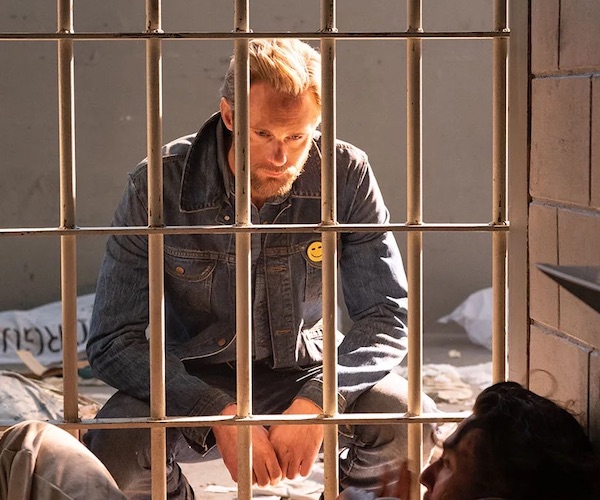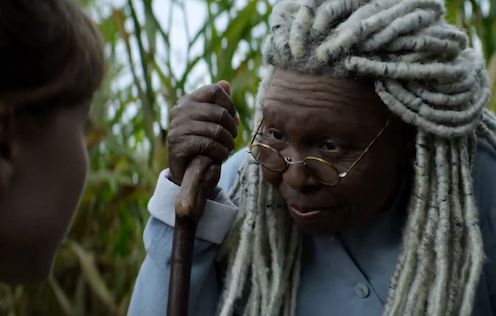WATCH CLOSELY: “The Stand” Stumbles
By Peg Aloi
Though the cast is generally excellent, Stephen King’s characters are often at the mercy of wrongheaded writing or needlessly flashy special effects.

Alexander Skarsgård in a scene from The Stand. Photo: CBS Interactive
Like many horror fans of my generation, I cut my teeth on the books of Stephen King. The first one I read was ‘Salem’s Lot (which inspired me at the age of 16 to seek out Bram Stoker’s Dracula and Shirley Jackson’s “The Haunting of Hill House”), followed by Carrie, then The Shining, all of which I devoured, savoring the juicy language and evocative imagery. Then along came The Stand in 1978, and I became convinced at an early age that here was a literary giant, or at the very least, a novelist with an impressive grasp of speculative fiction and a stunning vision of what the horror genre could be.
Film and TV adaptations of King’s work have not always been met with praise from critics or fans. Notable exceptions include Stanley Kubrick’s atmospheric and terrifying version of The Shining, Rob Reiner’s Stand by Me in 1986, adapted from King’s novella The Body, Frank Darabont’s The Shawshank Redemption in 1994 (also adapted from a novella in that same collection, Different Seasons), and the 2017 version of It, directed by Andrés Muschietti. ‘Salem’s Lot had a moderately successful miniseries adaptation in 1979 (starring Starsky and Hutch heartthrob David Soul), and The Stand was adapted for TV in 1994, starring Gary Sinise and Molly Ringwald. The Shining was also made into a miniseries in 1997, starring Steven Weber and Rebecca de Mornay. Many fans appreciated that it was a slightly more faithful adaptation than Kubrick’s engrossing yet sometimes inscrutable fever dream. More recently, a clever and well-written series entitled Castle Rock (after the fictional Maine town King sets much of his work in) wove together different King characters and plot lines into each season.
What we used to call “miniseries” are now often referred to as “limited series” — if they are finite. Or called “series” if they are open-ended (the initial term “extended miniseries” was too clunky to last). This kind of extended chronicle is well suited to getting at the depths of King’s characters: his skill at character development has often been cited as one of his strengths as a novelist. Streaming now on CBS All Access, the new series based on The Stand reimagines King’s postapocalyptic story of plague and spiritual reckoning. It comes along as the world faces its own deadly pandemic. You’d have thought timing this good would have inspired a provocative adaptation but, alas, the effort is often overwrought or underwhelming. Though the cast is generally excellent, King’s characters are often at the mercy of wrongheaded writing or needlessly flashy special effects.
The Stand, created by Josh Boone (The New Mutants) and Benjamin Cavell (Justified and Homeland) is ambitious and more than ready to announce its relevance. We are immediately signaled that we are in the Here and Now — not the novel’s late ’70s setting. Frankly, reading the novel will be crucial to appreciating this adaptation, if only for the occasional clever Easter eggs that roll in from time to time. There’s a brief scene set during the aftermath of a superflu pandemic, followed by a flashback that establishes the characters’ back stories. From the beginning the superflu is treated as a given; the disease’s path of destruction and its impact on the main characters dominates the first few chapters of King’s (very long) novel. Here it is portrayed mostly with piles of corpses and stalled vehicles everywhere.
The first character we meet is Harold Lauder (Owen Teague, seen in It and It Chapter Two), a teenager who is peeking through a backyard fence at his former babysitter Frannie (Shirley’s Odessa Young). Harold is awkward and nerdy and super-smart. Surprised by some neighborhood bullies who proceed to chase him, we see that he is a young man full of fear and anger. Past abuse will drive his plot trajectory. Frannie’s father is sick; when she buries him we learn that their last conversation was about the fact she was pregnant. Because they need to leave their small Maine town for their safety, Harold convinces Fran to come with him to the closest CDC lab. In an infuriating deviation from the novel, Harold manages to save Fran’s life — he discovers her just after she attempted suicide. Young is excellent in the role, capturing many of the interesting psychological nuances of the character, but the script doesn’t let her express Fran’s feistiness, something this actress (who also starred in Assassination Nation) could surely deliver.
On their cross-country journey, they come across Stu Redman (James Marsden), who was brought to the CDC for tests when it’s discovered he seems to be immune. Stu’s a quiet guy, recently widowed, fighting to survive the military machinations tolerated by a government that wants to use him until the last possible moment. He has become tough and resourceful; his compassion has been stretched to the breaking point. The superflu wipes out roughly 99 percent of the world’s population; those who are immune could be classified as charmed throwbacks. Alas, the film doesn’t delve too deeply into the details of the pandemic, though there are excellent scenes where admissions of guilt issue from the military officials overseeing Stu’s detainment. The army invented this bug, hoping to create a powerful biological weapon. King didn’t create the current wave of paranoia and conspiracy theories suggesting that Covid-19 was also a manufactured pandemic, but it’s hard to deny his prescience.

Whoopi Goldberg in The Stand. Photo: CBS Interactive.
All of the survivors have dreams featuring one of two figures: an elderly woman in Colorado (in the novel it was Nebraska) named Mother Abagail (Whoopi Goldberg) as well as a dark man from the West named Randall Flagg (Alexander Skarsgård). The moral alignment of the dreamers is revealed via who they envision: those who see Mother Abagail are decent folks; those drawn to the dark man are angry, selfish, and cruel. Abagail claims God speaks to her; Flagg is apparently in league with the devil. Miracles and magics occur, but the show is so determined to make the supernatural as dramatic as possible that the special effects fall flat. In King’s novel, the dreams lead people to their new homes in Boulder, CO, and Las Vegas. In Boulder they barely get the lights turned back on after weeks of work. They elect a committee of respected folks to lead them (Stu and Frannie among them). In Las Vegas, Flagg creates a community that wallows in decadence and chaos. (Flagg’s henchmen are former criminals and ne’er-do-wells.) A confrontation is a-brewing, but it is not clear what is at stake. In a world bereft of people, there’s enough stuff for everyone to share.
While most of the cast members are excellent (the rich characterizations of Greg Kinnear as Glenn Bateman and Jovan Adepo as Larry Underwood will satisfy lovers of the novel), some of the performers fall short. In particular, there’s the problem of Amber Heard as Nadine Cross, a major figure in the book who helps decide the fates of fellow survivors as well as the future of Flagg’s empire. Heard’s bland performance suggests she doesn’t understand just how important Cross is. King comes up with a delightful back story for Mother Abagail, who is given plenty of humor, wisdom, and grit. But here the role is thinly written and Goldberg is fairly lackluster. Skarsgård is great as Flagg, relishing the character’s charm and sadistic cruelty; but too much razzle-dazzle undercuts Flagg’s mysterious powers, and he isn’t given an origin story. Some major characters have been cut, which is troubling. Others are reimagined with different races or genders from the originals, which works fairly well. And some are given inspired portrayals, particularly Tom Cullen (Brad William Henke) as an affable giant with developmental disabilities and Nick Andros (Henry Zaga), a deaf man whose solitary ways are challenged when he ascends to becoming a community leader.
On the positive side, the creators have paid attention to some vital aspects of King’s work. There’s the use of vintage rock and roll music, for instance, including songs whose lyrics appear as epigraphs in the novel, such as Blue Öyster Cult’s “Don’t Fear the Reaper.” And yet the older music clashes with the creators’ decision to set the series in the modern day. Ostensibly so that, early on, a character can tell us that Harold’s shame was shared on social media. The fact is, the plague destroys life’s creature comforts, which renders the internet and personal technology obsolete. This idea would seem to set up the perfect opportunity for the script to observe how the sudden loss of modern gadgets forces people to reinvent the art of socializing. Maybe even rediscover their most baseline selves.
Instead, this adaptation of The Stand is content to scratch the surface of these individuals. It’s an oddly revealing failure of nerve: at a time when many of us are forced into solitude, battered by social upset and grief, the series could have provided viewers enormous strength from seeing characters who battle loneliness and loss — and emerge stronger for it. King’s characters find themselves, for no reason, in a surreal time, bedeviled by darkness and vivid dreams. Those of good will unite, at last, to do battle with the very heart of evil. The scenario is not all that different from the one we find ourselves in. The Stand fails to seize a golden opportunity and offer a nurturing vision that would lead us forward.
Peg Aloi is a former film critic for the Boston Phoenix and member of the Boston Society of Film Critics. She taught film studies in Boston for over a decade. She writes on film, TV, and culture for web publications like Vice, Polygon, Bustle, Mic, Orlando Weekly, Crooked Marquee, and Bloody Disgusting. Her blog “The Witching Hour” can be found at themediawitch.com.

While I was watching this series unfold, the same thought kept running through my mind: “I don’t understand…how could they screw this up?” The 90’s adaptation was certainly no masterpiece by any stretch of the imagination. But this thing somehow managed to be worse. It also committed the sin above all other sins when telling a horror story: It was boring. Who knew that the apocalypse could be so boring? Ugh.